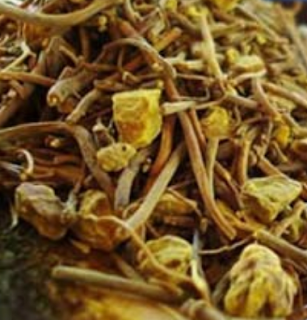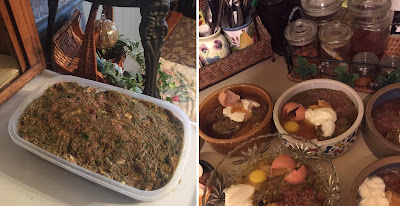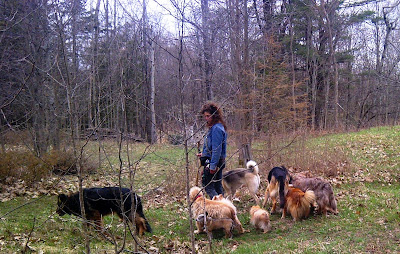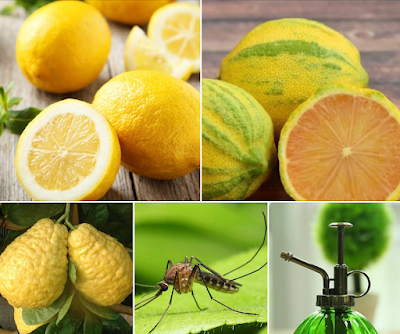Natural, Herbal Wormers and Worming Aids for Dogs and Cats to Prevent and Treat Infestations
★ 10.5 min read
In
this article:
1.0 Symptoms of Intestinal Parasite Infestation
2.0 Common Intestinal Parasites in Dogs and Cats
3.0 If You Think Your Dog or Cat has Worms
4.0 Important Tips to Support Overall Body Health
5.0 Supplemental Foods to Support Worming
- Fluids to Aid Worming Treatment and Prevent Blockage
- Bone Broth Recipe
- Short Cooked Broth Recipe
- Parsley Water Recipe
- Rooibos Tea
- Foods and Herbs to Support Worming Treatment
- Carrots and Garden Beets
- Coconut Oil
- Papaya
- Turmeric
- Golden Paste
- Kefir and Yogurt
- Fur, Feathers, Raw Meaty Bones, Coconut Oil and More Worming Aid Foods and Supplements
6.0 Natural and Herbal Wormers
- Garlic
- Grapefruit Seed Extract
- Pumpkin Seeds
- Cloves
- Goldenseal
- Black Walnut Hulls
1.0 Symptoms of an Intestinal Parasite Infestation
One or more symptoms may present:
- Anemia
- Digestive Issues
- Bloating
- Cramps
- Constipation
- Diarrhea
- Dehydration
- Gas
- Greasy stools
- Nausea
- Parasites (dead or alive) in stool
- Swollen lymph nodes
- Vomiting
- Weight loss
- Consuming a lot of food but not putting on weight
- Fatigue
- Skin Issues
- Excessive scratching or licking around the anus, or base of tail
- Rash on the body
- Rash around anus or base of tail
- Scudding, scooting
2.0 Common Intestinal Parasites in Dogs and Cats
- Giardia
- Flukes
- Hookworms
- Round Worms (common round worm – Ascaris)
- Tapeworms
- Strongyloides – a type of round worm also known as Threadworm, Pinworm, Seatworm, etc.
- Trichinella - a type of round worm that causes trichinellosisor trichinosis.
3.0 If You Think Your Dog or Cat Has Worms (Intestinal Parasites)
Take a stool sample and have the sample tested for worms (this is called a worm count).
Once you have the results of the worm count...
If the test is positive for worms:
- Start treatment with a natural worming protocol (see further below).
- Support your animal's overall health (see further below),
If the test is negative:
- Don't worm your animal.
- You can help maintain a parasite-free state by including appropriate supplemental foods, go to this article.
4.0 Important Tips to Support Overall Body Health
A healthy body is not attractive to parasites. The key to preventing repeated infestations of intestinal worms - support the overall health of
your companion animal.
- Feed your dog or cat a species appropriate diet.
- Avoid including toxin and carcinogenic substances in the diet.
- Replace conventional flea, tick, mosquito preventatives with natural alternatives.
- Don’t over vaccinate your dog or cat – only vaccinate for what is truly necessary and have titter tests done to ascertain when repeat inoculations are required.
- Avoid use of antibiotics and other conventional medications unless your animal is in a life-threatening emergency situation. Choose natural care for all other situations, e.g. ear infections, diarrhea, urinary tract infections, etc.
- Choose health care products (e.g. shampoo, dental chews and toothpaste that are toxin and carcinogen-free.
- Don't use chemical-based cleaning products in your home.
- Don't use chemical-based pesticides, herbicides or fertilizers in your yard, on your grass, trees, garden, etc.
- Wash road-salt off of your dog and cat's paws.
5.0 Supplemental Fluids and Foods to Support Worming
If your dog or cat has a very minor infestation of intestinal parasites, the chance of intestinal blockage due to parasite die off is low.
However, if your dog or cat has a significant infestation chance of intestinal blockage is significant.
Adding appropriate fluids can prevent complications, prevent dehydration and provide essential nutrients.
5.1 Fluids to Aid Worming Treatment and Prevent Blockage
5.1.1 Bone Broth
for dogs, puppies, cats and kittens
Bone broth supports health in multiple ways, and its simple to make.
For the:
- Health benefits of bone broth.
- Bone broth recipe.
Go to this article.
5.1.2 Short Cooked Broth
for dogs, puppies, cats and kittens
Short cooked broth can be used instead of bone broth.
Short cooked broth takes much less time to make (than bone broth) and its the perfect alternative for dogs and cats that cannot have bone broth due to specific health issues.
For the short-cooked bone broth recipe:
- Go to this article.
5.1.3 Parsley Water
for dogs, puppies, cats and kittens
If your dog or cat has liver problems, kidney or gall bladder problems or is pregnant or lactating do
not use parsley water. Parsley is high in oxalates and can cause issues for
dogs or cats with renal issues.
Add parsley water to your dog or cat’s food during deworming
treatment. Parsley is rich in many nutrients,
it is also a natural diuretic.
Recipe
- Boil 1 quart of water
- Add one bunch of fresh parsley (curly parsley, Italian flat leaf parsley, etc.) to the boiling water
- Allow to simmer for 3 minutes
- Remove from heat and allow to cool
- Remove the parsley and discard it
-
Pour the liquid into a glass jar and store in the refrigerator
Dosage
1 tbsp parsley water for every 10 lbs of body weight.
Administer once a day for 10 days.
Caution
- If your dog or cat has liver problems, kidney or gall bladder problems or is pregnant or lactating do not use parsley water.
- Parsley is high in oxalates, avoid use for dogs and cats with renal issue, or calcium oxalate(CaOx) crystals and stones.
- Use Rooibos Tea (see just below) instead of parsley water.
- Health benefits of rooibos tea.
- How to use rooibos tea.
- Serving size recommendations.
Go to this article.
5.2 Foods and Herbs To Support Worming Treatment
When treating your dog or cat for worms it is important to include
foods in their diet that naturally:
- Help with the expulsion of the parasite (foods ‘scrub’ the weakened worms out of the digestive tract).
- Boost the immune system.
- Sooth inflamed intestinal walls.
- Help to kill parasites and prevent re-infestation.
5.2.1 Carrots or Garden Beets
for puppies and dogs
Add one of these veggies to each meal to help cleanse the digestive tract and scrub parasites away.
Daily Dosage
Fresh, finely grated:
½ tbs to 2 tbs a day.
Beets (garden beets, not sugar beets)
½ tbs to 2 tbs a day.
In 2008, a scientific study was done in which Garlic was tested against Ivermectin. Garlic proved to be an effective natural alternative to conventional synthetic-chemical pesticide worming agents such as Ivermectin.
Medium Size Dogs:
Large Size Dogs:
5.2.2 Papaya
For dogs and puppies
Papaya contains four natural anti-parasitic compounds with strong worm-killing properties. Naturally occurring enzymes in papaya also aid digestion.
Learn more about the health benefits of papaya for dogs and puppies.
- Go to this article.
Daily Dosage
Finely diced or pureed papaya (no seeds):
- 1 tsp to 1 tbs.
5.2.3 Turmeric
For dogs, puppies, cats and kittens
Turmeric helps reduce inflammation of the intestine
walls caused by intestinal parasites (worms).
For:
- More about the health benefits or turmeric.
- Dosing instructions.
- Cautions and other important information.
Go to this article.
5.2.4 Golden Paste Worming Support Recipe
For dogs, puppies, cats and kittensMy Golden Paste recipe is an effective, simple to make anti-inflammatory, blood purifying, digestive, immune system supporting, anti-parasitic aid.
For:
- The Golden Paste recipe.
- More about the health benefits or golden paste.
- Dosing instructions.
- Other important information.
Go to this article.
5.2.5 Kefir and Yogurt
For dogs, puppies, cats and kittens
Plain, natural yogurt and kefir are rich in
beneficial microbes
that help keep disease causing microorganisms at bay while replenishing the
intestinal tract with friendly flora.
For kefir and yogurt:
- Health benefits.
- How to select appropriate products.
- Daily serving amount.
Go to this article.
5.2.6 Fur, Feathers, Raw Meaty Bones, Coconut Oil and More Worming Aid Foods and Supplements
For dogs, puppies, cats and kittens
For more worming aid foods, supplements including:
- Apple Cider Vinegar.
- Coconut Oil.
- Coconut Sap Vinegar.
- Fur and Feathers.
- Honey (raw).
- Omega Fatty Acids.
- Raw Meaty Bones.
- and more.
- Plus instructions for use, dosage and health benefits.
Go to this article.
6.0 Natural and Herbal Wormers
- Garlic
- Grapefruit Seed
- Pumpkin Seed
- Cloves
- Goldenseal
- Black Walnut Hull
When treating an infestation of intestinal worms, a typical worming protocol is: dose for 7 days up to 10 days, then withhold dosing for 7 days. Then dose for 7 up to 10 days. Then stop dosing.
Choose one or several of the natural wormers listed below, based on your dog or cat's personal situation.
6.1 Garlic (Allium sativum)
For dogs and puppies over 6 months of age
Health Benefits of Garlic
In 2008, a scientific study was done in which Garlic was tested against Ivermectin. Garlic proved to be an effective natural alternative to conventional synthetic-chemical pesticide worming agents such as Ivermectin.
Learn more about the health benefits of garlic for dogs.
- Go to this article.
- You can decide to give your dog garlic just during worming treatment, or;
- You can add garlic to your your dog's daily diet if she self-selects it.
- Learn about self-selection in this article.
Preparation
- Chop, mince, crush or press the garlic and allow it to sit at room temperature for 10 to 15 minutes before giving the garlic to your dog or cat;
- This gives the allinn and alliinase sufficient time to undergo the enzymic reaction that creates allicin.
Recommended
Daily Dosage for Dogs
- 1 clove fresh garlic (or 1 tsp minced/finely chopped) per every 30 lbs of body weight per day.
Cautions
- Garlic is NOT for dogs under 6 months of age.
- Garlic should NOT be given to Japanese dog breeds, learn more here.
- Health condition, drugs and other contradictions for use, go here.
- Additional information regarding cautions, go here.
Grapefruit Seed – Pulverized Seed or Extract
For dogs, puppies and cats and kittens
For dogs, puppies and cats and kittens
The
benefits of Grapefruit Seed Extract (GSE) were first noted in 1972 by physicist
Dr. Jacob Harich who observed its broad spectrum use as an antibacterial and
antiviral remedy. You can read more about Dr. Jacob Harich and the history of
GSE here.
Grapefruit
seeds contain active ingredients that are anti-microbial, anti-fungal,
anti-bacterial, anti-inflammatory and more. Grapefruit seed extract is known to
be excellent for treating internal diseases caused by bacteria, viruses, fungi,
it is used topically to treat and remedy skin diseases, external injuries and
fungal infections.
- University of Georgia researchers found that GSE is an effective antiviral, antifungal and anti-parasitic agent for fighting many viral and bacterial infections, including E. coli.
- Additional findings have proven that GSE is a highly effective treatment for:
- 800 bacterial and viral strains.
- 100 strains of fungi, and.
- A multitude of single and multi-celled parasites, including intestinal parasites, giardia, etc.
GSE
is also an immune system booster. It contains:
- Hesperidin (a bioflavonoid), well known for its potent immune system benefits;
- Vitamin C, Citric Acid, sterols and multiple additional antioxidants that aid the immune system’s ability to battle infections.
Learn more about grapefruit seed extract:
- Health benefits.
- Cautions and interactions.
Go to this article.
Liquid GSE:
Grapefruit
Seed Can be Administered Two Ways
- Pulverized seeds can be used as an ingested treatment sprinkled on top of food;
- Grapefruit seed extract (GSE) drops can be mixed into the food.
Dosage
Liquid GSE:
- Minimum dosage - 0.5 drops per every kg (per every 2.2 lbs) of body weight.
- Maximum dosage - 10 to 15 drops per every 10 lbs of body weight 3 times a day.
- Dose for 10 days up to a maximum of 14 consecutive days.
Pulverized
GSE:
- 8 mg per every kg (per every 2.2 lbs) of body weight.
- Dose for 10 days up to a maximum of14 consecutive days.
Raw Pumpkin (Pepitas)
Seeds or Pumpkin Seed Oil
For dogs, puppies, cats and kittens
Raw, shelled, pumpkin
seeds and pumpkin seed oil provide:
- Antimicrobial support.
- Antioxidant support.
- Nutrient support.
- Natural wormer.
Use
raw, shelled organic pumpkin seeds.
For worming purposes, use pumpkin seed along with another natural wormer.
Pumpkin seed on its own will NOT resolve an infestation of worms.
Preparation
Preparation
Instructions for Use
- Add the ground pumpkin seeds to your dog or cat's food once a day for two weeks.
- Pumpkin seeds are a good source of zinc, vitamin A and are high in protein.
- You can also choose to add pumpkin seed to your dog or cat's diet on a regular, daily basis.
- For more information on the benefits of pumpkin seeds go to this article.
Dosage
Choose pumpkin seeds or pumpkin seed powder
Pumpkin seed powder
- 1/4 teaspoon for every 10 lbs of body weight.
- 1/4 teaspoon for every 10 lbs of body weight.
Storage
- Ground pumpkin seeds should be stored in the refrigerator.
- If storing for many months, it is best to freeze the ground seeds to avoid loss of health benefits.
Cloves
Cloves
have many health benefits and have been used for both their medicinal and
culinary properties by humans dating back 2000 years. Their benefit in the fight against internal
parasites is two-fold:
- Cloves contain a compound that increases the white blood cell count which boosts your dog’s immune system – a healthy dog is not a good host for a parasite infestation.
- Cloves contain potent antibacterial properties and anti-parasitic properties.
Dosage
Small puppies and kittens:
1/8 of a whole dry clove, crushed and mixed into food once a day for a
week.
Then withold for one week.
Then repeat dosing for one week. Small Size Dogs, Puppies and Cats:
¼ of a whole dry clove, crushed and mixed into food once a day for a
week.
Then withold for one week.
Then repeat dosing for one week.
Medium Size Dogs:
½ of a whole dry clove, crushed and mixed into food once a day for a
week.
Then withold for one week.
Then repeat dosing for one week. Large Size Dogs:
1 whole dry clove, crushed and mixed into food once a day for a
week.
Then withold for one week.
Then repeat dosing for one week.
Cautions
- Not for preganant and lactating dogs and cats.
- Not for puppies or kittens under 3 weeks of age.
Goldenseal
For dogs and cats
Goldenseal
is an antimicrobial agent and digestive aid that enhances the medicinal
qualities of herbs that it is blended with. Goldenseal contains berberine, a
compound that works against parasites such as giardia, liver fluke and
pinworms.
Preparation
and Dosage:
- Use the appropraite dosage for your animal's weight based on the dosing chart below.
- Mix the goldenseal into food.
Black
Walnut Hull (Juglans nigra)
Not for puppies and kittens
Use
- Do not use for a prolonged period of time.
- Example of dosing schedule for worming:
- Dose 7 days on 14 days off, then repeat.
- Then stop use.
- Example of dosing to help maintain an intestinal worm-free state:
- Dose 3 days per month.
Dosage
- First time use: start with 1 drop per day then increase by an additional drop per day to the maximum amount per body weight.
- Tincture form (regular strength, do not use extra strength):
- 1 drop for every 10 pounds of body weight
- Capsule form:
- ¼ of a 500mg capsule for dogs 5 to 25 pounds
- ½ capsule for dogs 25 lbs and up
Cautions:
Article and graphics by Karen Rosenfeld
-
Must be used with caution as black walnut contains a high levels of
tannins and alkaloids that can damage organs if used excessively.
- Is not to be used as a regular supplement on a long-term daily basis.
- Black walnut hull should only be used when worming is required or periodically to help keep your dogor cat worm-free.
Holistic Diet, Nutrition, Wellness Services Tailored to Your Individual Dog and Cat
For information about my holistic diet, nutrition, wellness services visit my:
Maintain good health | Address acute and chronic health issues | Pre and post surgery support and recovery
My holistic wellness services are available worldwide via video consultation.
🌎 USA | Canada | UK | Europe | Australia | New Zealand | Asia | South and Central America | Africa | UAE
📱 FaceTime | Facebook | Skype | WhatsApp
Holistic Behavioral Services For Your Dog
For information about my holistic behavioral services visit my:
For dogs of all ages, sizes and breeds
My holistic behavioral services are available locally in-person and worldwide via video session.
🌎 USA | Canada | UK | Europe | Australia | New Zealand | Asia | South and Central America | Africa | UAE
📱 FaceTime | Facebook | Skype | WhatsApp
Affiliations to Companies
✓ None.
✓ I don't sell food or supplements.
✓ I'm not aligned with any companies.
✓ None.
✓ I don't sell food or supplements.
✓ I'm not aligned with any companies.
Article and graphics by Karen Rosenfeld































